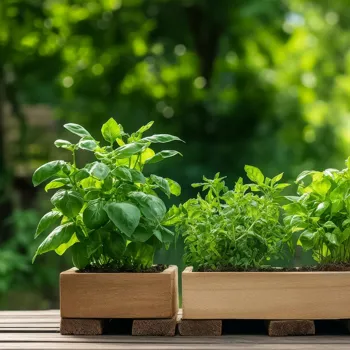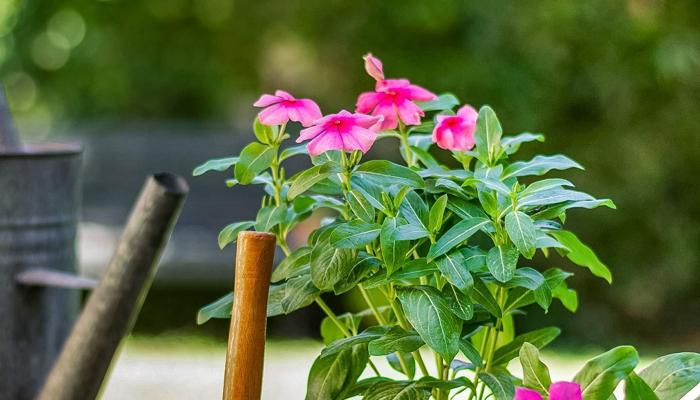Discover the magic of organic gardening with these 8 simple methods! Transform your space into a vibrant oasis of fresh produce
Hello, friends! Are you fed up with tomatoes that taste like water and spinach
that seems to have lost its zip? Do you dream of a garden bursting with fresh, flavorful veggies, all grown right there in your own little corner of the world? Well, pakka, you've come to the right place!
Organic gardening isn't just for folks with fancy farms; it's something all of us can weave into our daily lives, no matter how small our space. Think of it as a way to connect with nature, get some exercise, and, most importantly, enjoy food that’s genuinely good for you.
Forget those chemical-laden store-bought veggies; let's get down to the nitty-gritty of growing our own organic goodness!. This isn’t about becoming a full-time farmer; it’s about making small, manageable changes that can have a big impact on your health, your wallet, and the planet.
Are you ready to ditch the chemicals and embrace the organic lifestyle. Its a guaranteed and simple process to follow!
Okay, so where do we even begin? You don't need acres of land or a PhD in botany. The beauty of organic gardening is its simplicity.
It’s about respecting nature and working with it, not against it. So grab your gloves, put on your gardening chappals, and let’s dive in! Firstly, start small, think manageable, and always remember the joy it brings.
Kitchen Scrap Magic: Your Free Fertilizer Factory!
Did you know that your kitchen is a goldmine of potential plant food? Eggshells, vegetable peels, coffee grounds – they’re all packed with nutrients that your plants will absolutely love. Instead of tossing them in the trash, start a compost bin!
There are tons of easy-to-make compost bin designs available online, from simple buckets to elaborate multi-bin systems. The basic principle is the same: layer "green" materials (like vegetable scraps and grass clippings) with "brown" materials (like dried leaves and shredded paper).
Keep it moist and turn it regularly, and in a few months, you’ll have a rich, dark compost that will give your plants a serious boost. No space for a full-fledged compost bin? No problem! You can also create a worm bin, which uses worms to break down food scraps into nutrient-rich "worm castings.
" These castings are an amazing fertilizer for potted plants and garden beds. Its a sustainable way to discard and produce fertilizer!
Container Gardening: Green Thumb, Small Space!
Living in an apartment? Don't let that stop you from creating your own organic oasis. Container gardening is the perfect solution for urban dwellers. You can grow herbs, vegetables, and even small fruit trees in pots on your balcony, patio, or even a sunny windowsill.
Choose containers that are large enough to accommodate the mature size of your plants, and make sure they have drainage holes. Use organic potting mix, which is specifically formulated to provide the nutrients your plants need without the use of synthetic fertilizers.
Some easy-to-grow container plants include tomatoes, peppers, spinach, lettuce, and herbs like basil, mint, and cilantro. The convenience of container gardening is unmatched whether its a small space or a large one! Simply monitor watering and enjoy the experience.
Herb Power: Flavor and Fragrance, Right at Your Fingertips!
Herbs are super easy to grow, even for beginners, and they add a burst of flavor to your cooking. Plus, their fragrant leaves can repel pests and attract beneficial insects to your garden. Plant herbs like basil, rosemary, thyme, mint, and oregano in pots or garden beds.

They prefer well-drained soil and plenty of sunlight. Once established, they require very little maintenance. Simply water them regularly and harvest the leaves as needed. You can even dry your own herbs to preserve them for later use.
Nothing beats the flavor of freshly picked herbs, and knowing that they're organically grown makes them even more delicious, plus herbs are generally low maintenance plants making it useful for people with busy schedule.
Companion Planting: Friends in the Garden!
Just like people, plants have friends and enemies. Companion planting involves growing certain plants together that benefit each other. For example, planting basil near tomatoes can help repel pests that attack tomatoes, while marigolds can deter nematodes in the soil.
Carrots and onions are also a good combination, as the onions repel carrot root flies. Do some research to find out which plants are good companions for the vegetables you want to grow. This is a natural way to control pests and diseases without using harmful chemicals.
This way you will have a natural defence line for any of your plants.
DIY Pest Control: Nature's Arsenal!
Forget those nasty chemical pesticides! There are plenty of natural ways to keep pests at bay in your organic garden. For example, you can make a simple insecticidal soap by mixing dish soap with water. Spray this on plants to kill aphids, whiteflies, and other soft-bodied insects.
You can also use neem oil, a natural insecticide derived from the neem tree, to control a wide range of pests. Another effective method is to attract beneficial insects to your garden, such as ladybugs, lacewings, and praying mantises.
These insects are natural predators of garden pests and will help keep your plants healthy. Some plants, like marigolds and nasturtiums, also attract these beneficial insects.
Water Wisely: Saving Every Drop!
Water is a precious resource, so it's important to use it wisely in your organic garden. Water deeply and less frequently, rather than shallowly and often. This encourages plants to develop deep roots, which makes them more drought-tolerant.
Use a watering can or a drip irrigation system to deliver water directly to the roots of your plants, rather than spraying it all over the leaves. Avoid watering during the hottest part of the day, as much of the water will evaporate before it can reach the roots.
You can also collect rainwater in barrels or tanks to use for watering your garden. This is a great way to conserve water and save money on your water bill. Mulching your plants will also hold moisture in the soil, slowing evaporation.
Seed Saving: The Cycle of Life!
Seed saving is a wonderful way to connect with the natural cycle of life and preserve heirloom vegetable varieties. At the end of the growing season, let a few of your best plants go to seed. Once the seeds are dry, collect them and store them in a cool, dark, and dry place.
The next year, you can plant these seeds and continue the cycle. Seed saving is a great way to save money and ensure that you always have a supply of your favorite vegetables. it also allows you to adapt plants to your local climate, making them even more resilient.
Embrace the Imperfect: Nature's Way!
Organic gardening is not about achieving perfect, flawless vegetables. It's about working in harmony with nature and accepting the imperfections that come with it. You might have a few blemishes on your tomatoes, or a few holes in your lettuce leaves, that's perfectly normal, so embrace them.
They just mean that your vegetables are truly organic and haven't been treated with harsh chemicals, remember these imperfections are a badge of honor. It is a sign that you are growing in a natural and sustainable way. In summary, organic gardening should be treated as a fulfilling hobby.
So there you have it! Eight simple ways to incorporate organic gardening techniques into your daily life. With a little effort and patience, you can transform your living space into a thriving organic garden, filled with fresh, flavorful vegetables and herbs. Happy gardening, friends.
These simple ways will bring freshness into your diet and life.
AI Generated Content. Glance/InMobi shall have no liability for the content












